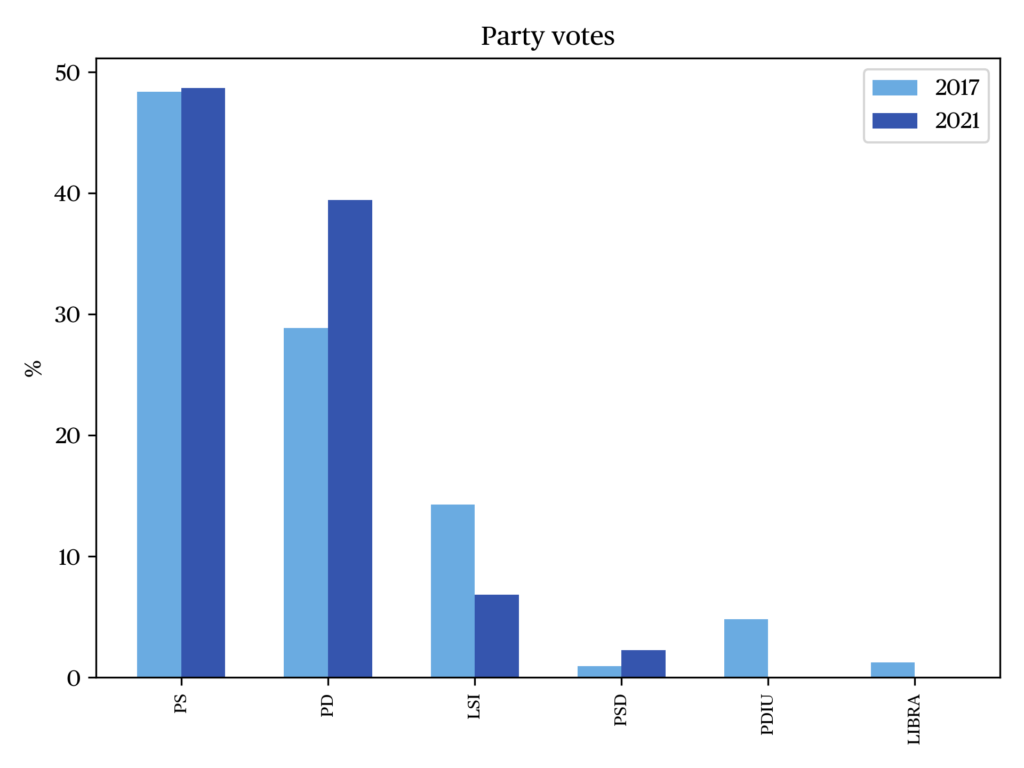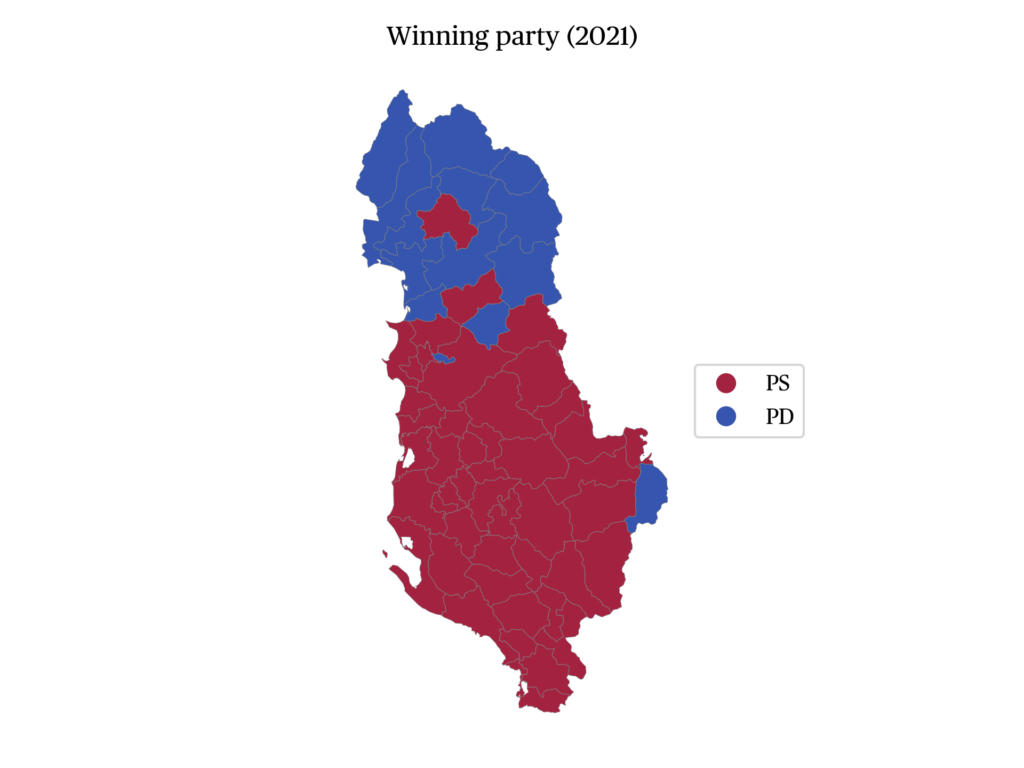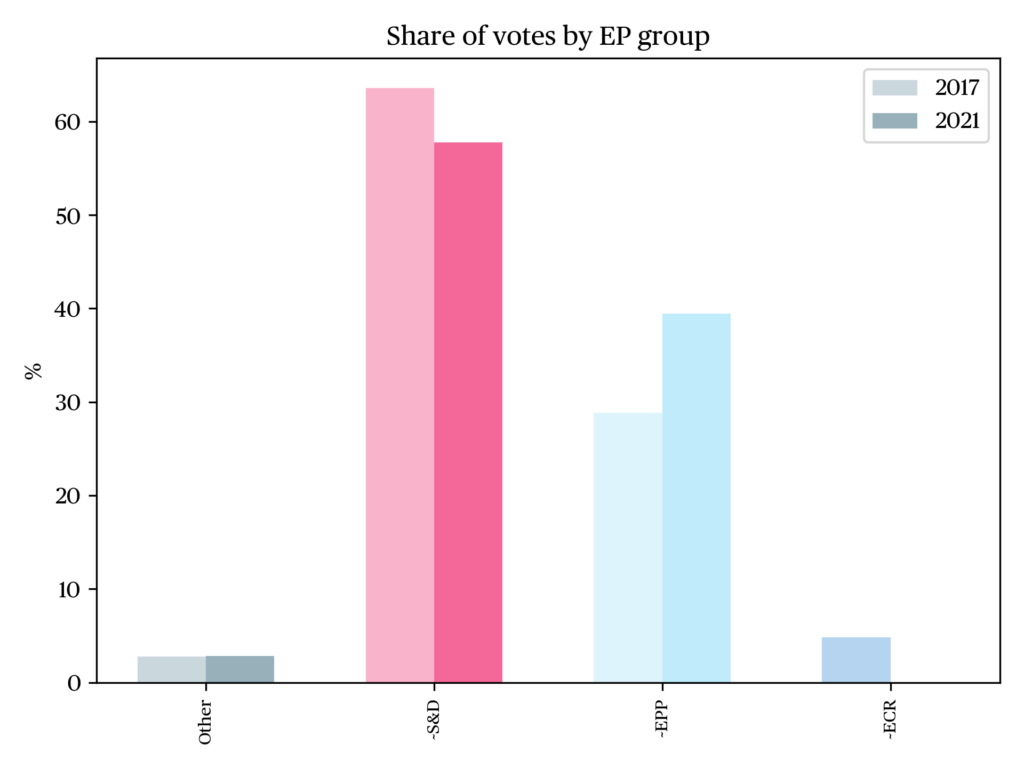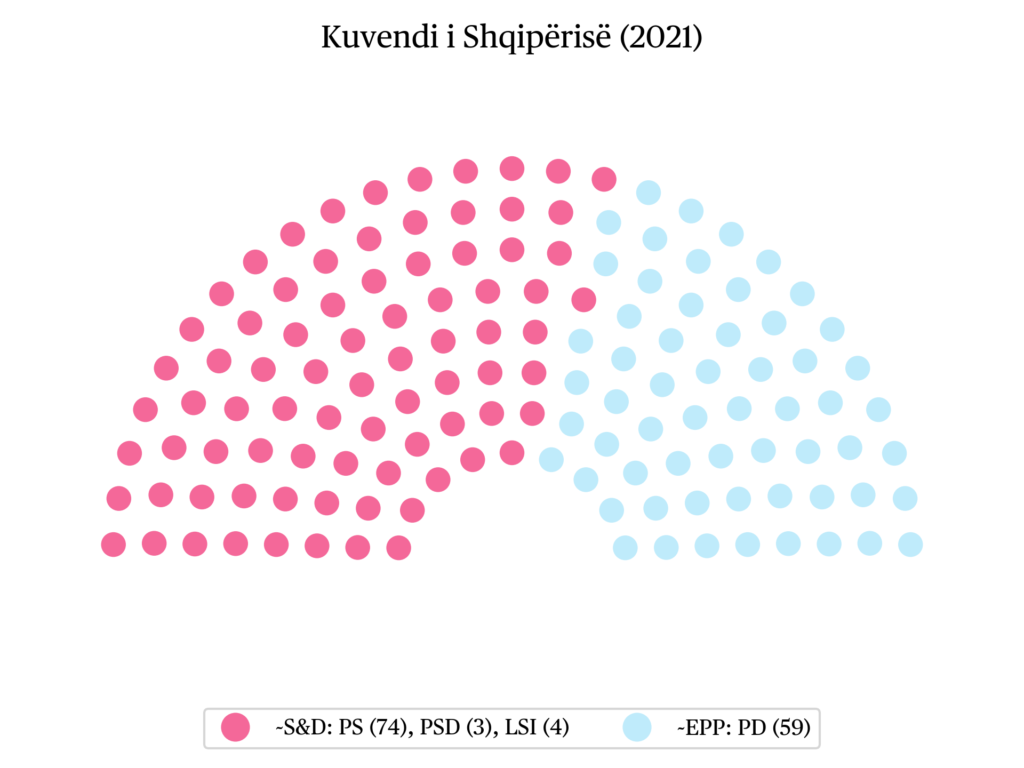Parliamentary Election in Albania, 25 April 2021

Ilir Kalemaj
Deputy Rector, University of New York TiranaIssue
Issue #1Auteurs
Ilir Kalemaj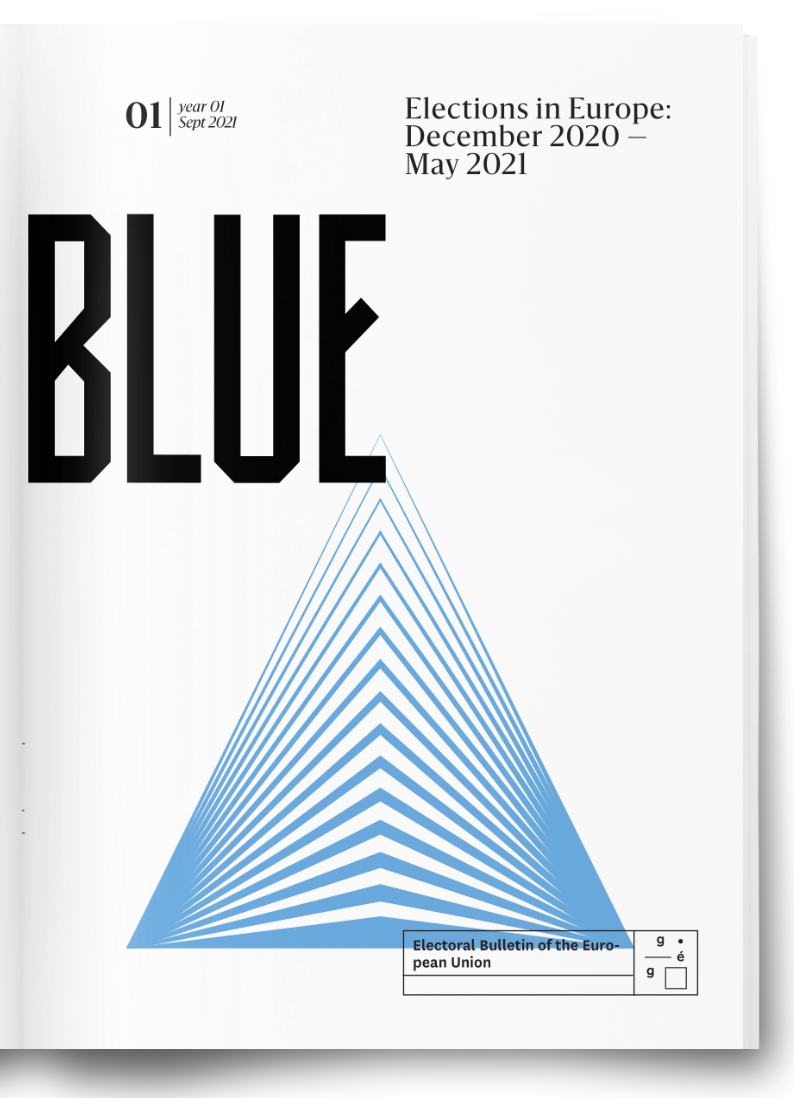
21x29,7cm - 102 pages Issue #1, September 2021 24,00€
Elections in Europe: December 2020 — May 2021
Context of the vote
On 25 April, Albania held its 10th consecutive parliamentary elections in the post-communist period. The first elections took place in 1991 and were won by a landslide majority by the ruling communists, followed by snap elections in 1992 which saw a sweeping victory of the Democratic Party (alb. PD). Meanwhile, the previous communist party transformed itself into the new Socialist Party (alb. PS), led by its first chairman Fatos Nano. The next elections took place in 1996, when widespread vote fraud was witnessed and condemned by preliminary reports from OSCE/ODIHR and other international organizations. The PD won this election by a wide margin, winning 123 deputies out of 140 in the Albanian parliament.
The next preliminary elections took place a year later, in 1997, after a general revolt that followed the collapse of the pyramidal schemes in the country. The PS won by a landslide and held power under various governments until 2005, winning also the elections of 2001.
The PD came in power through coalitions both in 2005 and 2009, while losing power in 2013 elections, when PS and the Socialist Movement for Integration (alb. LSI, Europhile left) formed a coalition that gathered more than nine hundred thousand votes, and, in partnership with some smaller parties, led a comfortable majority. The Socialist Party of Albania-led Alliance for a European Albania eventually received 57.6% of the vote, winning a solid majority of 83 out of the 140 parliamentary seats.
The 2017 elections were specific for a number of reasons. First of all, the elections were postponed by three months, after a political crisis that the opposition led by PD had initiated. The date of the election had been negociated and agreed upon on 18 May in a meeting between PD leader Basha and PS chairman Rama. Second, because the parties ran separately, pre-election coalitions were not formed between the opposition parties. PD. LSI and the other smaller parties on the right ran in a single list with the Democratic Party, therefore not being able to generate all the votes that they would otherwise mobilized if they would have run their campaigns independently within a pre-electoral coalition. As a result, the PS won 74 of the 140 seats (Koleka, 2017).
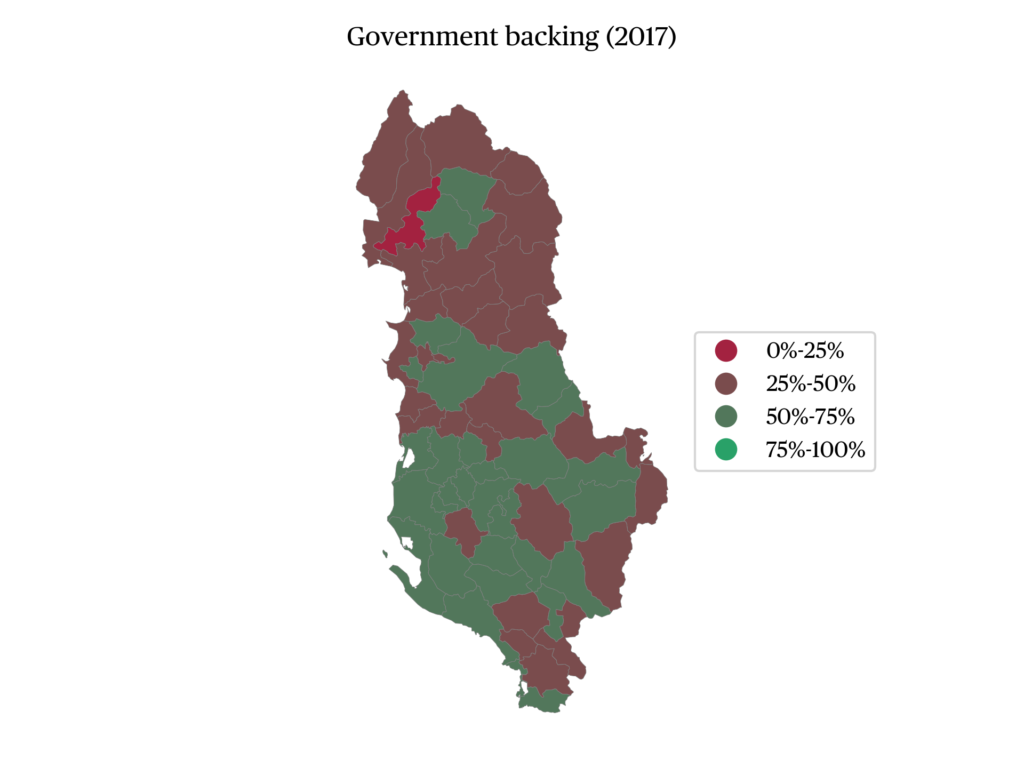
a • Support for the PS government by municipality in 2017 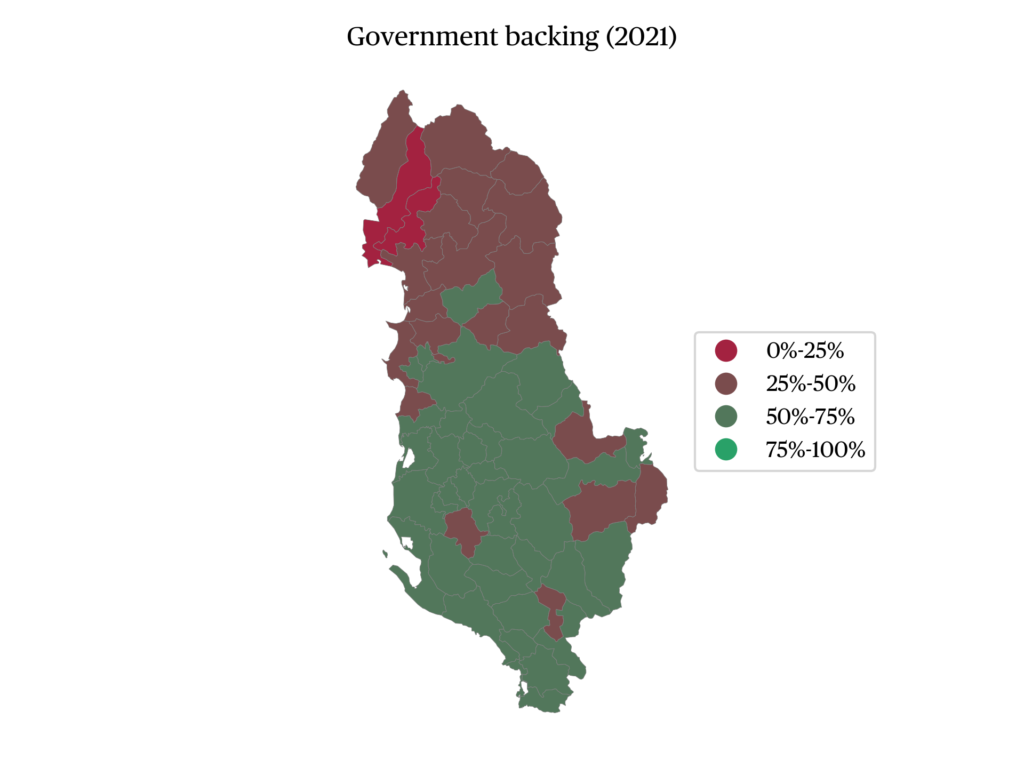
b • Support for the PS government by municipality in 2021
Difficulties during the 2021 elections
One of the major problems that was witnessed in these elections was the very high number of irregular votes. There were 83,028, more than five percent of the total number of votes cast on election day. The main cause of the invalid votes was mistakenly selecting different candidates from the party as a result of people being confused with the new system.
As the partial recounting of the districts of Berat and Durres showed, there were no major irregularities witnessed in the voting centers. This was also made possible by the new changes in the electoral law, which in addition to representatives of the major parties in the electoral commissions also allowed the use of security cameras in each voting center as well as the presence of international observers in selected centers. Furthermore, the representatives of all parties and the independent candidates had to sign the required papers by the time of completion of vote counting.
On the other hand, a major problem that persisted in these elections was the use of public administration to support the ruling PS. For example, in one of her interviews right after the elections, the head of the OSCE/ODIHR observer mission, Ursula Gacek, talked of “the misuse of the resources of public administration” and the “fuzzy position between the [Socialist] party and the state” (Bushati, 2021). This has been a persistent problem also in the past, and OSCE/ODIHR said that it will be reflected in their final report as one of the recommendations not fulfilled.
The biggest concern however is the opposition claim that the government and PS have used illicit funds and other favors to buy electoral votes massively, which dictated the overall result. Some exponents of the opposition have claimed that they would not recognize these elections, prompting fears of a déjà vu where the opposition walked out of the parliament on February 16, 2019 and decided to “burn” their mandates. PD leader Lulzim Basha and LSI leader Monika Kryemadhi, however, have not given any indication of this radical step. Although both have claimed that these elections had been manipulated and that they would soon furnish evidence for their claims, they have also made clear that they would enter the parliament and make use of this political arena to denounce the electoral crimes. According to PD and its electoral expert Ivi Kaso, the electoral crimes were particularly affecting the results in the districts of Elbasan and Shijak. Kaso added that so far, PD has filed more than 180 criminal charges (Kaso, 2021).
Evolution of electoral participation and parties’ vote sharess
On first glance, it seems that PD has improved considerably compared to the 2017 elections, or even to the other two previous general elections. For example, PD has had an electoral result of 610,463 votes in 2009 when it won the elections together with LSI, then it fell down do 528,373 votes in 2013 when it lost the elections to PS that came in power in coalition with LSI. PD continued to lose ground in the 2017 elections, when it fell to a new low of 456,481 votes, and finally recouped in the present elections of 2021, reaching a new high of 622,126 votes.
But this analysis hides the fact that in the 2021 elections, PD had incorporated all smaller right-wing parties (i.e. the Republican Party, the Christian-Democratic Party etc.) and even some centrist and center-left parties such as the Justice, Integration and Unity Party (alb. PDIU) and the Agrarian Party. For example, the PDIU party alone has three representatives in the new parliament, selected as part of the winning list of the Democratic Party. The Greek minority is represented by the leader of PBDNJ Vangjel Dule who was elected as part of the list of the Democratic Party. On the other hand, a Greek minority representative Niko Kuri is elected as part of the PS list for Vlora district. Therefore, both PD and PS have their own representatives of the Greek minority.
Regarding the newly created parties that ran in these elections, the Albanian Democratic Movement led by Myslim Murrizi (Alb. LDSH) received only 4697 votes, the Movement for Change (LN) led by Jozefina Topalli received 7049 votes nationally, whereas the Democratic Conviction (BD) led by Astrit Patozi received 8238 votes. All these three parties were splinter parties of the Democratic Party that ran for the first time in these elections. Additionally, two other parties that were newly created were the New Movement (LRE) party led by Arian Galdini, which received 3771 votes, and Nisma Thurrje, which received 10216 votes. There were also some independent candidates that ran in different districts. Overall, 46 parties ran in this election, down from 54 in 2017.
Meanwhile, the Central Election Commission (CEC) has published the average age of the winning MPs based on preliminary results. In the new parliament, the youngest MP is from the Democratic Party — Andia Ulliri, 22 years old, while the oldest is Luljeta Bozo, 79 years old and comes from the Socialist Party. The youngest average age is that of LSI candidates with 45.5, while the oldest is that of PSD with 49.7. Slightly lower comes PD with 49.5 and PS with 49.3. According to the CEC, 10 deputies are aged under 35 and three over 70 (KQZ).
Political geography and spatial distribution
In the 2021 elections, PS has won 53% of the mandates with only 49% of the votes. It has registered particularly strong growth in four districts, namely in Tirana, where it grew 20 thousand more votes as compared to 2017, Durrës, with four thousand votes more, Dibër, with 3947, Elbasan district, with 13343 votes more than in 2017, while it had a lower number of total votes in the other eight districts throughout the country (Kume, 2021).
Support for the incumbent government appears to be generally lower in the northwest and northeast of the country, especially in the Shkodër and Kukës regions, while it is higher in the southwest and south of Albania, especially in the Vlorë and Kukës districts. Regarding the distribution of votes in the 12 districts from north to south between PD and PS, it is as follows: Shkodër 43% PD and 28% PS, Kukës 62% PD and 35% PS, Lezhë 47% PD and 38% PS, Dibër 45% PD and 44% PS, Durrës 41% PD and 50% PS, Tiranë 39% PD and 48% PS, Elbasan 37% PD and 55% PS, Fier 37% PD and 52% PS, Berat 30% PD and 56% PS, Korcë 40% PD and 48% PS, Vlorë 31% PD and 57% PS, Gjirokastër 30% PD and 53% PS (see “data” panel).
On the other hand, it is important to note that if the local elections would be taking place today, PD would have won only 14 municipalities out of 61 in total, based on the current distribution of votes (Kume, 2021; see also “ data” panel). This, of course, has to be taken into consideration with the caveat that other factors may impact the distribution of votes in the next local elections, from the timing of the elections to the composition of the candidates’ lists.
In any case, this also confirms a regular trend, observed in the last general and local elections, whereby PS obtain the largest and steadiest gains by municipality (figure c).
Principal component analysis (PCA) can be used to identify municipalities that behave differently from the Albanian average. For example, in figure d, we see that 72% of municipality-level variance can be explained by the higher share of votes of PD (and the corresponding lower share of votes of PS) in some Northern municipalities; on figure e, we see that 21% can be explained by a better performance of the LSI and PSD in specific municipalities.
The analysis gains further relevance if we are to consider that in the autumn of the current year, preliminary local elections (partly or in full) are due to take place. This follows an expected decision of the newly assembled Constitutional Court about the constitutionality of the 2019 local elections, which took place without the participation of the opposition. The opposition decided to boycott those elections, claiming that massive, unpunished fraud had taken place in the 2017 parliamentary elections. The distribution of the votes that we witnessed in the 2021 parliamentary elections does not seem to favor the opposition in the upcoming local elections, at least for the time being.
With repect to the urban/rural axes, the voter distribution highly favored the SP in a majority of the rural/periphery and semi-peripheral areas. This Is especially important in a country such as Albania where almost half of the population still lives in the rural and periphery areas, the highest such percentage in Europe today.
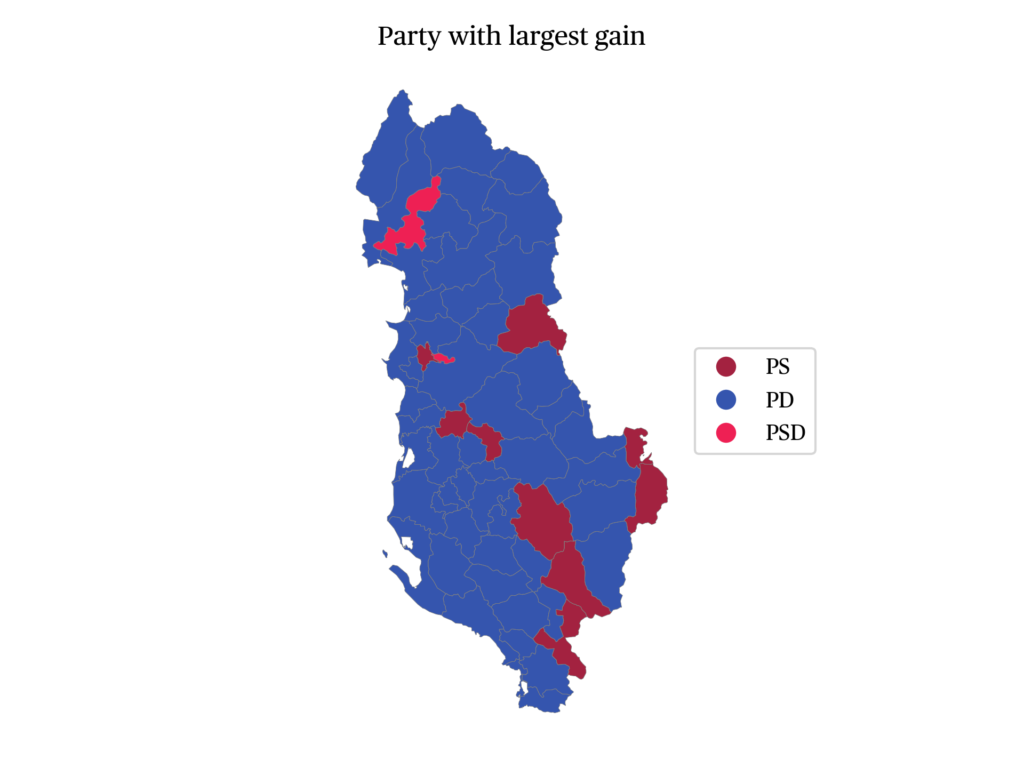
Possible government coalitions and their consequences
Under most pre-election analyses and predictons, no single party could have possibly won the majority of 71 deputies or 51 percent by its own. Some of the public declarations of Premier Rama mentioned that possibility, although mostly with the goal of expressing optimism and confidence that he and the PS would be able to pull a third in a row victory and govern without a coalition. It seems that contrary to the opposition’s expectations, as well as to the majority of election predictions by independent observers, PS not only won as the single biggest party (widely expected), but also received 74 deputies, thereby being able to form the next government completely by itself.
We should note, however, that prior to election day, Premier Rama offered the possibility of creating a grand coalition to PD and its leader Lulzim Basha, an offer that probably was conditioned by the possible lack of majority on election day by the PS. The day after the election, Mr. Rama congratulated PD and its leader Basha on their performance and said that it recognized them as the only “loyal opposition”. He thus in a way retracted its pre-election offer of co-governance, but also added that he recognizes no borders in its cooperation with the opposition as long as it is done in the spirit of reforms that would enable Albania to open the negotiations with the European Union (interview with Edi Rama, 2021).
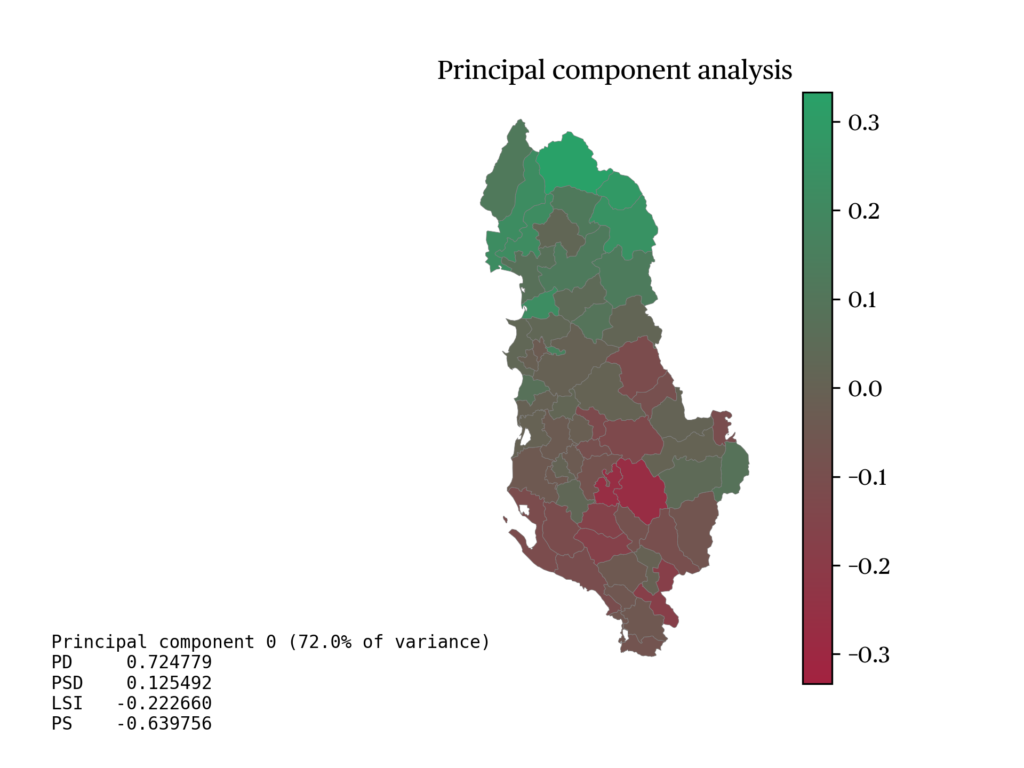
d • Principal component analysis: first eigenvector 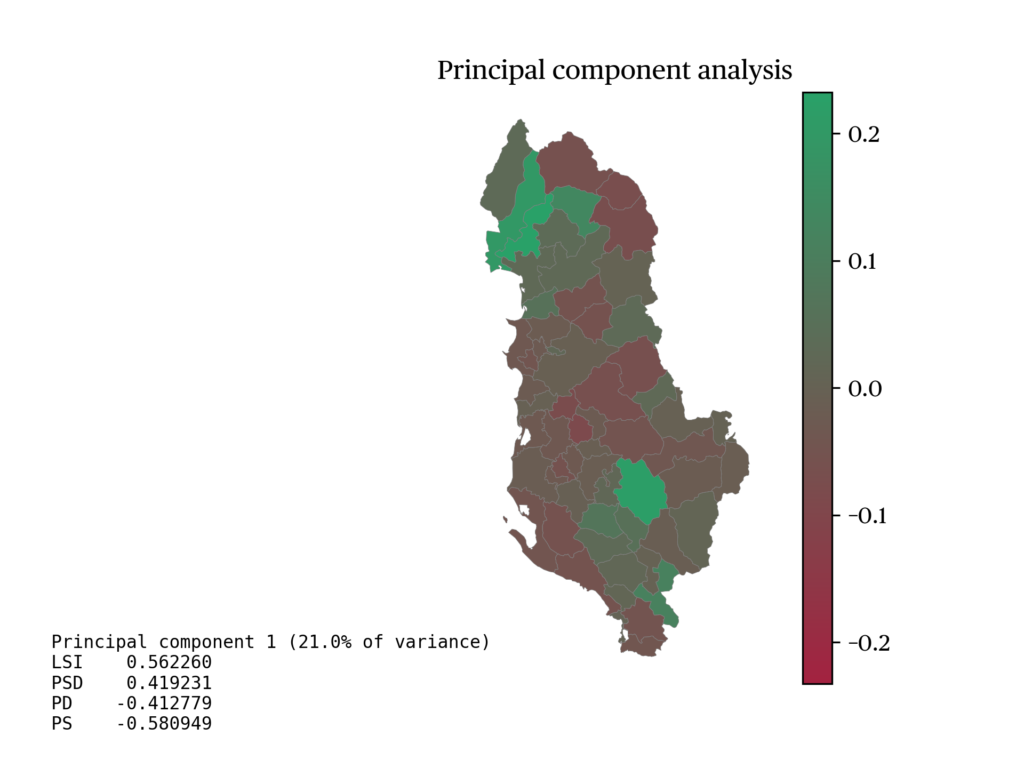
e • Principal component analysis: second eigenvector
European perspectives and effects of the outcome on international and interregional politics
For any careful observer of the social and political life of Albania, the result of the elections of April 25, 2021, was not unexpected. A combination of early and late factors, related to the way democracy and the constitutional and legal system of this country work, the political culture, the parties’ decision-making, the distortions created by usage of the public administration to the profit of the ruling party, the imbalance of the numbers of electoral colleges between the regions, the exclusion of emigrants from electoral rights etc. have made the outcome previsible.
The international actors were seriously committed to restoring the constitutional standards of political life and democracy, by guaranteeing free elections and institutional reform. The U.S. Embassy mediated to calm the crisis of handover of mandates through the agreement of June 5, 2020. It also reminded the Albanian political class from time to time of the red lines that should not be crossed. Such were the messages of deputy assistant Secretary of State Mathew Palmer on his virtual visit to Tirana: credible candidates, transparent and standard elections and a call for tomorrow’s government to duly complete the justice reform.
At first glance, it seems that international actors are negotiating with the country’s elite, reyling on the principle that in Albanian political parties, the biggest societal group interests are represented. It is often assumed that party decisions and the selection of human resources observe statutory rules, which impose an internal democracy, elite criteria, respect for cultural communities, and consequently representation of the sovereign will. In fact, the reality is more complex and offers a somewhat different picture. The political system is often highly impenetrable, due to the myriad of political parties and coalitions that run in general or local elections, while the party leaders randomly select personalities whose formal education or moral background often seem dubious. Sometimes, candidates that have had criminal affiliations are either running or backing their favorite candidates, although Albania passed a decriminalization law some time ago (Law No. 138/2015).
A prime example of this is Tom Doshi, the leader of the Social-Democratic Party (PSD), who despite the repeated calls of the U.S. Embassy in Tirana to back down based on his previous records, decided to run nonetheless. As the U.S. ambassador clearly stated: “This is not just from a person or an individual in the United States government, but it is the United States Secretary who has personally identified an individual who has not chosen to continue to represent the Albanian people in the Assembly” (Politiko,2021). Tom Doshi was elected but resigned right after the election, because of the American pressure. Nonetheless, his party elected three candidates, which for the opposition is unacceptable, since the party did not present any political program or made any sensible economic promises and its elected candidates, with the exception of Doshi, were unknown to the general public. The same goes for one of the most voted candidates of the PS in Tirana district, Ornaldo Rakipi, who is suspected to have been massively voted because of family ties rather than of any other personal quality — he is equally unknown to the public or socialist voters (Dosja, 2021).
International observers also made it clear in the preliminary OSCE/ODIHR report that the falsification of votes continued even in this election. Moreover, we witnessed the placement of shady candidates in the lists, whose source of income is unknown. Basically, there was no prior financial transparency; no strict obligation to report on political parties spending was imposed by the regulators of the electoral process, therefore creating an inequality in the selection of the candidates and their respective campaigns.
Bibliography
Bushati, A. (2021, 1 May). Nuk fitoi PS-ja, na grabiti shteti. Lapsi. Online.
Kaso, I. (2021, May). PD përgatit për ankimim dosjen me shkeljet gjatë zgjedhjeve, Kaso: Cilat janë zonat me krimin më të lartë zgjedhor. Politiko. Online.
Koleka, B. (2017, 26 June). Albanian Socialists to get parliamentary majority: partial vote count. Reuters. Online.
Komisioni Qëndror i Zgjedhjeve. Online.
Kume, M. (2021, 3 May). Mandati i tretë, ja rezultatet e Partisë Socialiste në cdo bashki. Panorama daily.
Ligj Nr. 138/2015. PËR GARANTIMIN E INTEGRITETIT TË PERSONAVE QË ZGJIDHEN, EMËROHEN OSE USHTROJNË FUNKSIONE PUBLIKE.
Nd. (2021). SURPRIZA/ Aqif Rakipi fut djalin në listën e PS në Tiranë, vetë u dogj nga dekriminalizimi por shpresat i ka tek i biri. Dosja. Online.
Rama, E. (2021, 29 April). Si dhe me kë do të qeverisë Rama? Interview, Opinion show. Online.
Tjera, E. (2021, 23 March). Tom Doshi was not expelled from the CEC, Yuri Kim reacts: This does not mean that he is innocent. Politiko. Online.
The Data
citer l'article
Ilir Kalemaj, Parliamentary Election in Albania, 25 April 2021, Sep 2021, 79-84.
à lire dans cette issue
voir toute la revue






